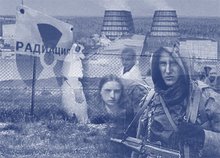School on Nuclear Security

Nuclear Security School co-director Andrea Braunegger-Guelich of the IAEA.
11/04/2011 - Trieste
While the effects of the recent Japan earthquake on its nuclear energy facilities have raised worldwide concerns about nuclear safety, nuclear security--measures to prevent nuclear proliferation or sabotage, as well as the protection of nuclear materials--is a topic of equal importance and is the theme of a two-week school organized by ICTP and the International Atomic Energy Agency (IAEA).
The 'International School on Nuclear Security', held in Trieste from 11 to 22 April, brings together IAEA expertise and ICTP's international network of researchers in developing countries. The School's aim is to provide participants with the knowledge they need to meet obligations under the international nuclear security legal framework, to identify and remedy threats against nuclear security by using radiation detection strategies, and to respond to incidents involving nuclear and other radioactive material.
"Countries need to be more prepared for potential threats. The School helps to develop an international nuclear security culture," said School co-director Andrea Braunegger-Guelich, also of the IAEA Office of Nuclear Security.
The Italian government initially proposed the School at last year's Nuclear Summit in Washington, where a number of nations pledged their support to strengthen global nuclear security. Italy, ICTP's chief sponsor, included the Trieste school amongst its nuclear security action plans.
ICTP actively supports a number of joint educational activities with the IAEA geared towards building competence in developing countries, including the School of Nuclear Knowledge Management, which has been successfully conducted at ICTP for the past six years.
Facts about the School:
- 250 applications
- 50 participants from 43 countries
- 20% women
- Participants come from regulatory authorities, universities, research institutes, different national ministries, and law enforcement agencies
More details about the School are available on its website.
The School is co-sponsored by the Central European Initiative and the Kuwait Foundation for the Advancement of Science.

